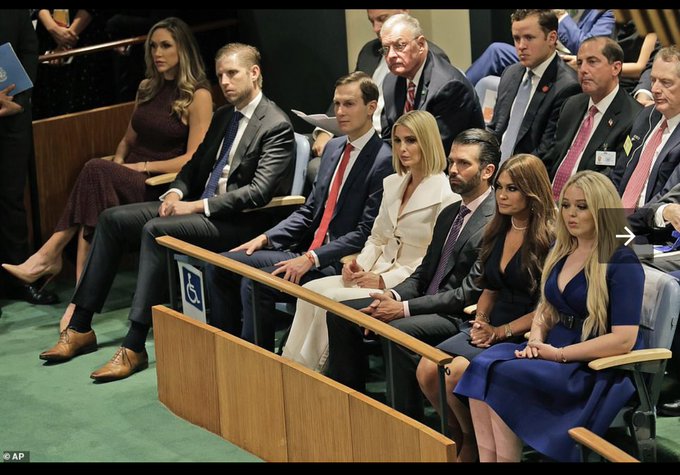
I need help with a caption for this pic.
Be nice. :)
 America, you asked for this guy, and now you are in the middle of a real s*&* show. You are watching in real time how a mob boss operates. It just so happens that this one is your president.
America, you asked for this guy, and now you are in the middle of a real s*&* show. You are watching in real time how a mob boss operates. It just so happens that this one is your president.… racism has been fundamental to American conservatism, and the G.O.P. in particular, since the mid-20th century realignment of the parties — even as its purportedly defining tenets have proven to be negotiable, from small government to antagonism toward autocrats to reduced deficit spending. None of this precludes the existence of nonracist conservatives, to be sure. It just makes them some of the least influential people in their movement, and renders their claims to broader relevance akin to shouting into a void.Cheney-Rice goes on to catalog various conservative policies, from border detention camps to voter-ID laws, that reflect the deeper-than-Donald-Trump influence of racism on the right. He argues that the various conservative factions have consistently made their peace with racism and racist policies since Richard Nixon, not just since 2016. And he suggests that since “the Republican Party would collapse without support from racists,” there is probably no path to a nonracist G.O.P. that doesn’t involve the total defeat and total reconstruction of the party.
Cheney-Rice is right that there is considerably more racism on the right than Republican Party elites wanted to believe pre-Trump and that the elite has conspicuously failed to confront its more overt and toxic forms — which is part of how we ended up with a birther as the president of the United States. In the longer view, he’s also right that white identity politics has been important to the conservative coalition since the 1960s, when the strategic and policy choices that the Nixon-era Republican Party made — in effect, rallying voters who opposed the Great Society’s vision of racial redress — ensured that a lot of racially conservative and racist white voters would migrate into the G.O.P.
But I disagree with Cheney-Rice that these underlying realities make change, indeed dramatic change, in how conservative politics approaches race all but unimaginable.
Some of that difference reflects philosophical differences about what constitutes racist public policy: I think conservatism can be nonracist, or at least substantially less racialized, without embracing the current progressive definition (from reparations to substantialimmigration increases to single-payer health care) of what anti-racism requires. But some of it reflects a different interpretation of the complexities of conservative policy history, and how our politics has reduced racial polarization in the past.
Those complexities first: If it’s true that conservative politicians, in the age of Trump and earlier, have supported policies that disadvantage minorities, it’s also true that the record of every post-Nixon Republican administrations has mixed other policies as well. Nixon himself accepted elements of the Great Society even as he undermined others. As Noah Smith pointed out recently, the modern multiracial America was forged as much by eight years of Ronald Reagan’s pro-immigration conservatism as by the original liberalizing 1965 reforms. George W. Bush’s administration sharply increased education spending in the hopes of closing racial gaps, pushed a homeownership agenda with a similar purpose, and started an AIDS-in-Africa initiative that saved millions of nonwhite lives. And for all his race-baiting, even Trump has pursued policies that don’t fit the white-identitarian frame — most notably a criminal-justice reform that built on state-by-state efforts that were championed by religious conservatives and libertarians as often as by Democrats.
 Let's play a little game. Imagine, if you will, former president Barack Obama playing fast and loose with American intelligence, and causing a high level American asset to be called out of the field. Imagine him publishing secret missile sites to millions of people. Imagine him planning a meeting with the Taliban at Camp David the very same week that Americans remember the September 11th attacks on this country. Imagine him saying nasty things every day to ordinary American citizens, while praising murderers and dictators. Imagine him spending over thirty percent of his time in office playing golf or being on a property that caters to those who play golf. Imagine a president Obama lying about the track of a Hurricane and commanding the leader of the agency charged with telling us about hurricanes to lie to us.
Let's play a little game. Imagine, if you will, former president Barack Obama playing fast and loose with American intelligence, and causing a high level American asset to be called out of the field. Imagine him publishing secret missile sites to millions of people. Imagine him planning a meeting with the Taliban at Camp David the very same week that Americans remember the September 11th attacks on this country. Imagine him saying nasty things every day to ordinary American citizens, while praising murderers and dictators. Imagine him spending over thirty percent of his time in office playing golf or being on a property that caters to those who play golf. Imagine a president Obama lying about the track of a Hurricane and commanding the leader of the agency charged with telling us about hurricanes to lie to us. 








